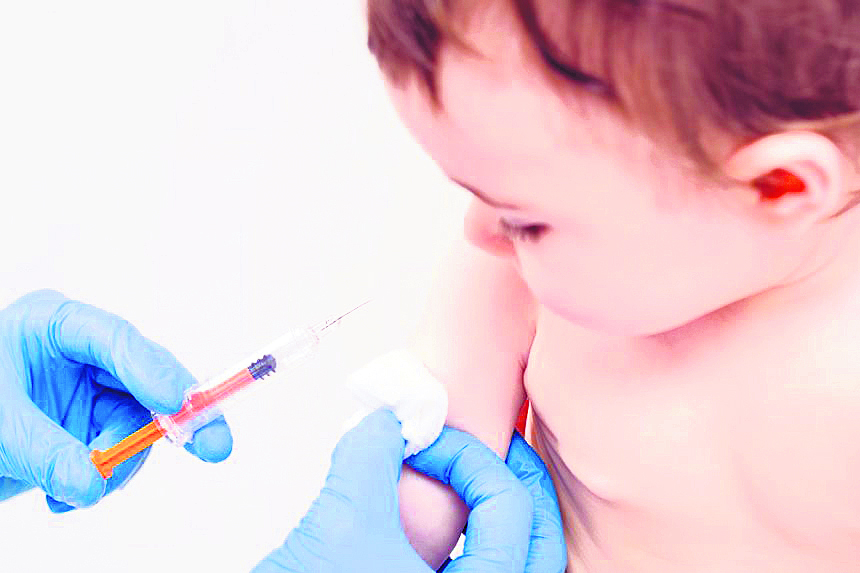Immunization for better health - myRepublica

Why do parents choose not to vaccinate their children against measles and rubella? Why do they fail to complete the second dose?
The government is launching measles-rubella (MR) immunization campaign for strengthening regular immunization program from today. The campaign aims at eliminating measles and rubella from the country in three years by providing booster dose of vaccines against measles and rubella to all children between nine months to five years old.
An estimated three million children across the country will be covered during the two-phased campaign to ensure that all children get the full doses of measles and rubella vaccines. The first phase commences on February 13 in Province 1, 2 and 5 and the second phase will start a month later in the rest of the provinces. Apart from this, the additional doses of polio are being provided in 19 districts of Tarai where cases of polio are still reported.
It should be noted that coverage of measles and rubella vaccine is only around 72 percent in the country. It means around 28 percent children are still under risk. In this context, the campaign run by the government is a welcome move. The target group of the campaign includes children from nine months to five years old. All children of this age group are supposed to get a booster dose vaccine during the campaign.
It is our duty to make the campaign a success for the healthy future of our children and our country. For this, we need to discuss problems and prospects of immunization program. We need to find the answers to these questions: Why do parents choose not to vaccinate their children against measles and rubella? Why do they fail to complete the second dose?
Poor compliance
The government of Nepal has been providing immunization for major vaccine-preventable diseases. The government provides immunization card to parents in which major doses of vaccines are recommended. Still, immunization noncompliance is a serious public health issue and families around the country fail to complete immunization cycle. Compliance of the first dose of vaccine—BCG—is around 91 percent but it goes down when the baby grows up. This is the trend in most other immunization programs. It seems that the parents fail to meet the compliance when their children are a few months old. So why does this happen?
First, vaccine cycle of measles and rubella begins at the age of nine months. Parents follow the vaccine cycle when their babies are too young but slowly they tend to forget or neglect the vaccine cycle if they feel that their babies are healthy.
Second, migration pattern has also contributed to discontinuity of immunization cycle. Often migrated people have other priorities. They may also struggle to find the right way to vaccinate their children in case they lose immunization card. Thus, updated schedule of all vaccines should be produced in local language.
Onus on health workers
Community health professionals at local level can play an important role to make the campaign a success. They are the ones who work with communities and they know the needs of the people. They can raise awareness to the community people using different platforms such as health mothers’ group meetings, immunization clinic and mobilization of Female Community Health Volunteers etc. They can also make the public aware through informal discussion at the health facilities and during home visits.
Second, local health professionals can initiate local level dialogue and discussion on the importance of immunization. Health workers, especially health facility in-charge and other staff, can raise awareness about importance of vaccine against measles and rubella through meaningful discussion with local level stakeholders such as schools, local government, mothers’ groups, local clubs etc.
Third, local health workers can also motivate people to ensure maximum coverage of vaccine program. Well trained and motivated frontline health workers can contribute to making the national campaign successful.
Another key role of health professionals is making public aware about importance of meeting full cycle of immunization. Measles and rubella can cause serious complications, including blindness, encephalitis, severe diarrhea, ear infection, pneumonia and even death. Thus leaving one child without full cycle of vaccine means s/he is prone to the disease.
We often say prevention is better than cure. This truly applies in case of measles and rubella prevention. WHO data shows around 17.1 million lives have been saved since 2000, largely due to increased vaccination coverage against this highly contagious viral disease.
Communicate the message
Proper communication is vital to make any campaign successful because right information in right time to right person is important. Health communication is not always about giving plain information. We need to have localized messages to address the diverse population in terms of language and culture and education level. Messages can be spread through social media, TV/radio programs and school-based awareness programs.
Immunization campaign should not be viewed as a one-time event. The campaign should continue until the desired results are achieved. There is need of introducing robust tracking system for the record of immunization to children so that health facilities and community health workers can remind concerned families about immunization date and time. This is important because the record can be referred by all health professionals even in case of transfer or replacement. Besides, community level awareness should be conducted before the campaign through home visits, health mothers’ group meetings, immunization center and local organizations.
Unvaccinated children are always at the highest risk of measles and rubella. It may even claim the lives of children. If not immunized, anyone can be infected from measles and rubella. Full doses of MR vaccines help in creating safer and healthier future. The campaign to immunize all children is for us. We all should be ambassadors of immunization campaign launched by the government.
The author is a public health professional with experience of working in Nepal’s remote districts. Views are personal
https://ift.tt/2SoW3Yf

Comments
Post a Comment